Analysis of Entrepreneurial Ventures and Small Business Impact Report
VerifiedAdded on 2020/07/23
|19
|5733
|48
Report
AI Summary
This report delves into the realm of entrepreneurship and small business management, exploring various types of entrepreneurial ventures such as lifestyle, survival, commercial, and social ventures. It examines the typology of entrepreneurship, including determined, copycat, female, and research entrepreneurs. The report highlights the similarities and differences between commercial and social enterprises, comparing their objectives, value creation, marketing strategies, and mindsets. It also assesses the significant impact of micro and small businesses on the UK economy, emphasizing their role in job creation, innovation, and economic growth, while also touching upon the challenges faced by these enterprises. Furthermore, the report underscores the importance of small enterprises and business start-ups in fostering economic growth, particularly in the context of Brexit, by highlighting their contributions to employment, poverty reduction, and overall national development. The report concludes with a discussion of different business structures like private entrepreneurship, sole proprietorship, and partnerships.

Entrepreneurship and Small
Business Management
Business Management
Paraphrase This Document
Need a fresh take? Get an instant paraphrase of this document with our AI Paraphraser
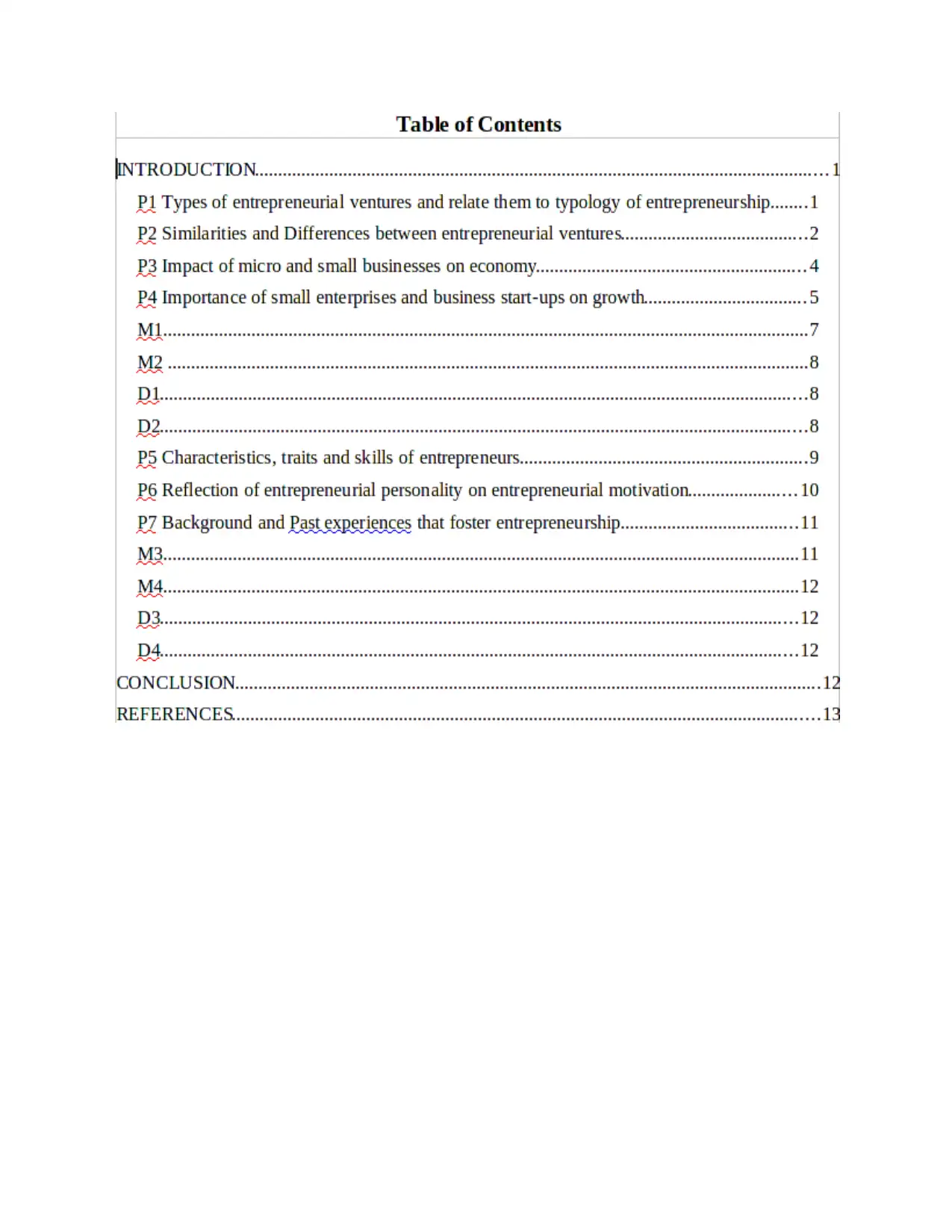

⊘ This is a preview!⊘
Do you want full access?
Subscribe today to unlock all pages.

Trusted by 1+ million students worldwide
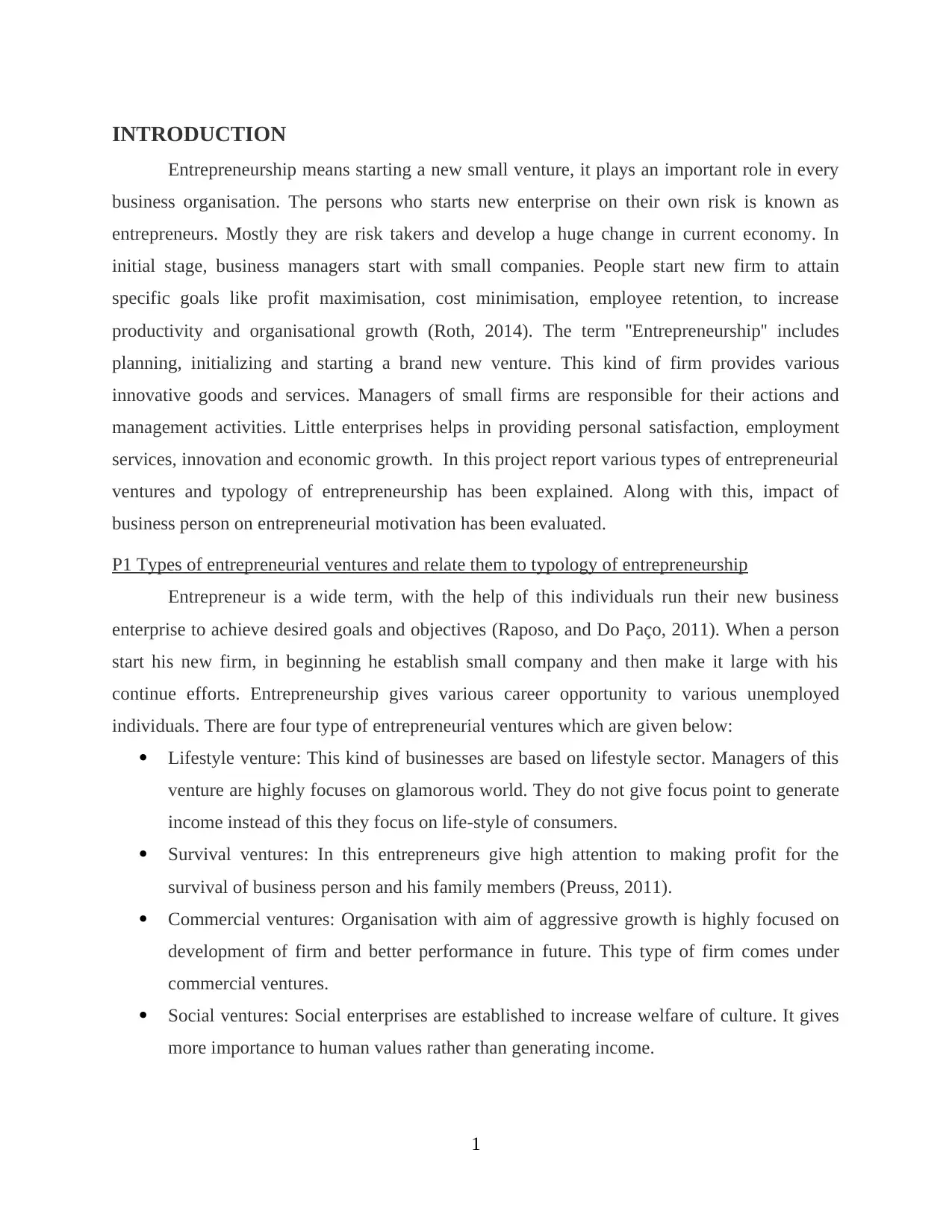
INTRODUCTION
Entrepreneurship means starting a new small venture, it plays an important role in every
business organisation. The persons who starts new enterprise on their own risk is known as
entrepreneurs. Mostly they are risk takers and develop a huge change in current economy. In
initial stage, business managers start with small companies. People start new firm to attain
specific goals like profit maximisation, cost minimisation, employee retention, to increase
productivity and organisational growth (Roth, 2014). The term ''Entrepreneurship'' includes
planning, initializing and starting a brand new venture. This kind of firm provides various
innovative goods and services. Managers of small firms are responsible for their actions and
management activities. Little enterprises helps in providing personal satisfaction, employment
services, innovation and economic growth. In this project report various types of entrepreneurial
ventures and typology of entrepreneurship has been explained. Along with this, impact of
business person on entrepreneurial motivation has been evaluated.
P1 Types of entrepreneurial ventures and relate them to typology of entrepreneurship
Entrepreneur is a wide term, with the help of this individuals run their new business
enterprise to achieve desired goals and objectives (Raposo, and Do Paço, 2011). When a person
start his new firm, in beginning he establish small company and then make it large with his
continue efforts. Entrepreneurship gives various career opportunity to various unemployed
individuals. There are four type of entrepreneurial ventures which are given below:
Lifestyle venture: This kind of businesses are based on lifestyle sector. Managers of this
venture are highly focuses on glamorous world. They do not give focus point to generate
income instead of this they focus on life-style of consumers.
Survival ventures: In this entrepreneurs give high attention to making profit for the
survival of business person and his family members (Preuss, 2011).
Commercial ventures: Organisation with aim of aggressive growth is highly focused on
development of firm and better performance in future. This type of firm comes under
commercial ventures.
Social ventures: Social enterprises are established to increase welfare of culture. It gives
more importance to human values rather than generating income.
1
Entrepreneurship means starting a new small venture, it plays an important role in every
business organisation. The persons who starts new enterprise on their own risk is known as
entrepreneurs. Mostly they are risk takers and develop a huge change in current economy. In
initial stage, business managers start with small companies. People start new firm to attain
specific goals like profit maximisation, cost minimisation, employee retention, to increase
productivity and organisational growth (Roth, 2014). The term ''Entrepreneurship'' includes
planning, initializing and starting a brand new venture. This kind of firm provides various
innovative goods and services. Managers of small firms are responsible for their actions and
management activities. Little enterprises helps in providing personal satisfaction, employment
services, innovation and economic growth. In this project report various types of entrepreneurial
ventures and typology of entrepreneurship has been explained. Along with this, impact of
business person on entrepreneurial motivation has been evaluated.
P1 Types of entrepreneurial ventures and relate them to typology of entrepreneurship
Entrepreneur is a wide term, with the help of this individuals run their new business
enterprise to achieve desired goals and objectives (Raposo, and Do Paço, 2011). When a person
start his new firm, in beginning he establish small company and then make it large with his
continue efforts. Entrepreneurship gives various career opportunity to various unemployed
individuals. There are four type of entrepreneurial ventures which are given below:
Lifestyle venture: This kind of businesses are based on lifestyle sector. Managers of this
venture are highly focuses on glamorous world. They do not give focus point to generate
income instead of this they focus on life-style of consumers.
Survival ventures: In this entrepreneurs give high attention to making profit for the
survival of business person and his family members (Preuss, 2011).
Commercial ventures: Organisation with aim of aggressive growth is highly focused on
development of firm and better performance in future. This type of firm comes under
commercial ventures.
Social ventures: Social enterprises are established to increase welfare of culture. It gives
more importance to human values rather than generating income.
1
Paraphrase This Document
Need a fresh take? Get an instant paraphrase of this document with our AI Paraphraser
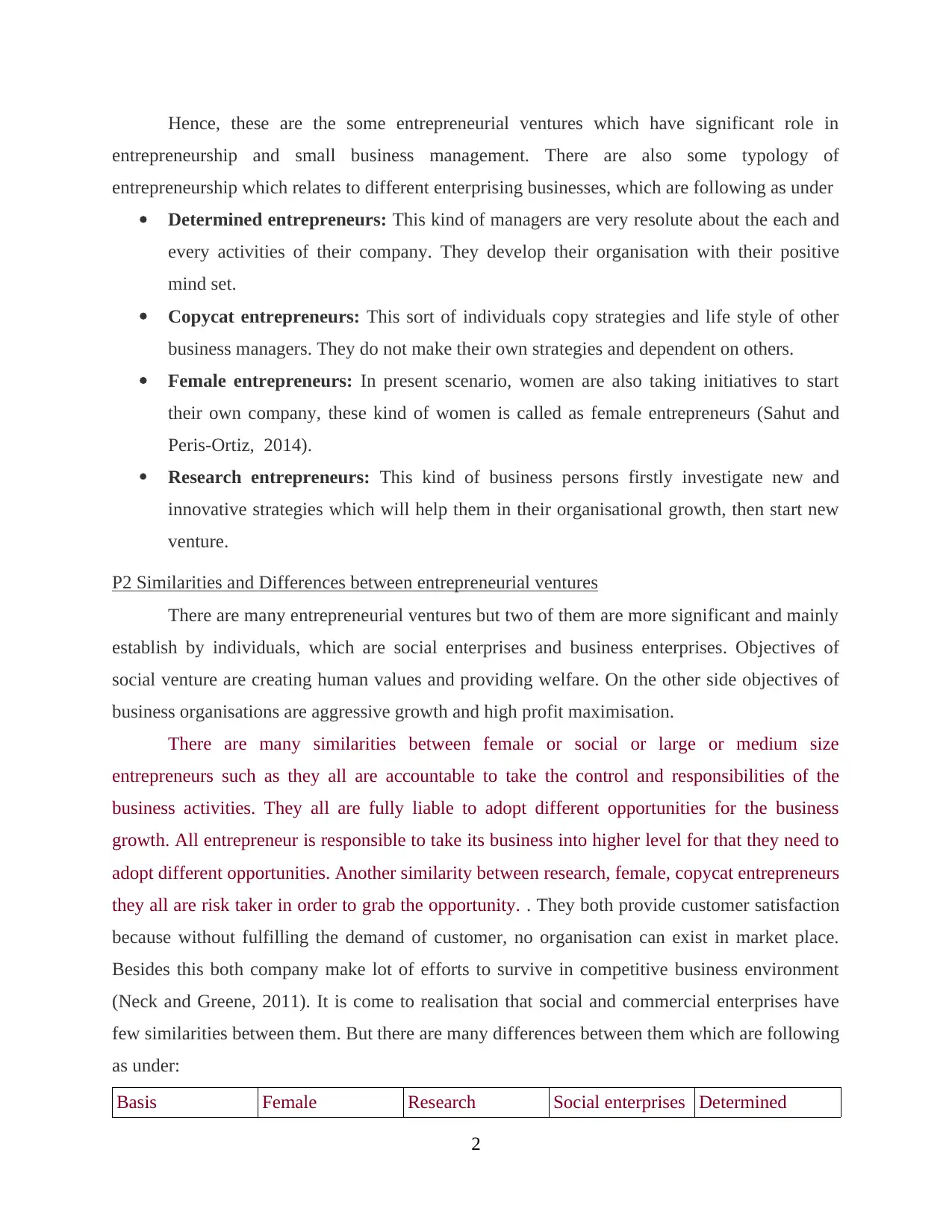
Hence, these are the some entrepreneurial ventures which have significant role in
entrepreneurship and small business management. There are also some typology of
entrepreneurship which relates to different enterprising businesses, which are following as under
Determined entrepreneurs: This kind of managers are very resolute about the each and
every activities of their company. They develop their organisation with their positive
mind set.
Copycat entrepreneurs: This sort of individuals copy strategies and life style of other
business managers. They do not make their own strategies and dependent on others.
Female entrepreneurs: In present scenario, women are also taking initiatives to start
their own company, these kind of women is called as female entrepreneurs (Sahut and
Peris-Ortiz, 2014).
Research entrepreneurs: This kind of business persons firstly investigate new and
innovative strategies which will help them in their organisational growth, then start new
venture.
P2 Similarities and Differences between entrepreneurial ventures
There are many entrepreneurial ventures but two of them are more significant and mainly
establish by individuals, which are social enterprises and business enterprises. Objectives of
social venture are creating human values and providing welfare. On the other side objectives of
business organisations are aggressive growth and high profit maximisation.
There are many similarities between female or social or large or medium size
entrepreneurs such as they all are accountable to take the control and responsibilities of the
business activities. They all are fully liable to adopt different opportunities for the business
growth. All entrepreneur is responsible to take its business into higher level for that they need to
adopt different opportunities. Another similarity between research, female, copycat entrepreneurs
they all are risk taker in order to grab the opportunity. . They both provide customer satisfaction
because without fulfilling the demand of customer, no organisation can exist in market place.
Besides this both company make lot of efforts to survive in competitive business environment
(Neck and Greene, 2011). It is come to realisation that social and commercial enterprises have
few similarities between them. But there are many differences between them which are following
as under:
Basis Female Research Social enterprises Determined
2
entrepreneurship and small business management. There are also some typology of
entrepreneurship which relates to different enterprising businesses, which are following as under
Determined entrepreneurs: This kind of managers are very resolute about the each and
every activities of their company. They develop their organisation with their positive
mind set.
Copycat entrepreneurs: This sort of individuals copy strategies and life style of other
business managers. They do not make their own strategies and dependent on others.
Female entrepreneurs: In present scenario, women are also taking initiatives to start
their own company, these kind of women is called as female entrepreneurs (Sahut and
Peris-Ortiz, 2014).
Research entrepreneurs: This kind of business persons firstly investigate new and
innovative strategies which will help them in their organisational growth, then start new
venture.
P2 Similarities and Differences between entrepreneurial ventures
There are many entrepreneurial ventures but two of them are more significant and mainly
establish by individuals, which are social enterprises and business enterprises. Objectives of
social venture are creating human values and providing welfare. On the other side objectives of
business organisations are aggressive growth and high profit maximisation.
There are many similarities between female or social or large or medium size
entrepreneurs such as they all are accountable to take the control and responsibilities of the
business activities. They all are fully liable to adopt different opportunities for the business
growth. All entrepreneur is responsible to take its business into higher level for that they need to
adopt different opportunities. Another similarity between research, female, copycat entrepreneurs
they all are risk taker in order to grab the opportunity. . They both provide customer satisfaction
because without fulfilling the demand of customer, no organisation can exist in market place.
Besides this both company make lot of efforts to survive in competitive business environment
(Neck and Greene, 2011). It is come to realisation that social and commercial enterprises have
few similarities between them. But there are many differences between them which are following
as under:
Basis Female Research Social enterprises Determined
2
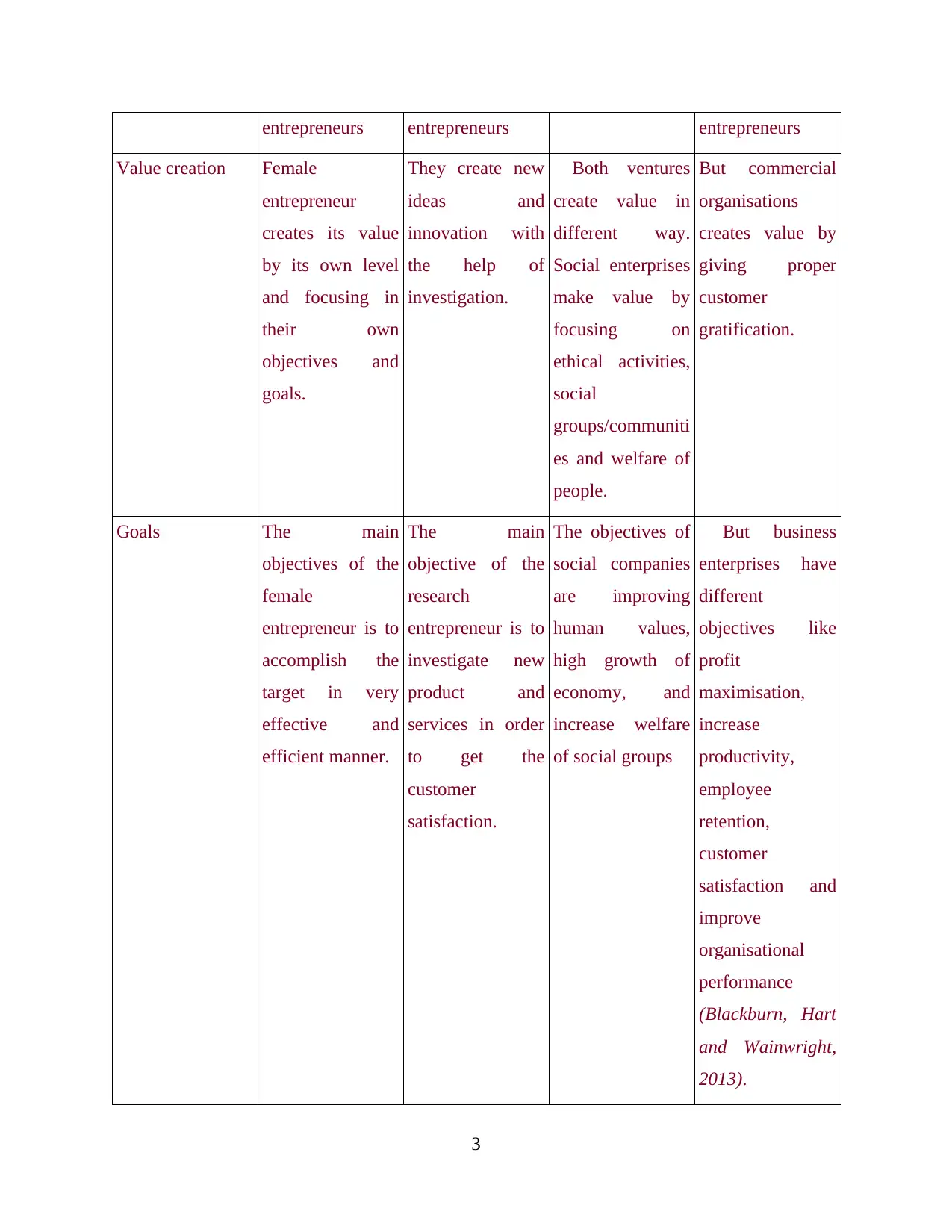
entrepreneurs entrepreneurs entrepreneurs
Value creation Female
entrepreneur
creates its value
by its own level
and focusing in
their own
objectives and
goals.
They create new
ideas and
innovation with
the help of
investigation.
Both ventures
create value in
different way.
Social enterprises
make value by
focusing on
ethical activities,
social
groups/communiti
es and welfare of
people.
But commercial
organisations
creates value by
giving proper
customer
gratification.
Goals The main
objectives of the
female
entrepreneur is to
accomplish the
target in very
effective and
efficient manner.
The main
objective of the
research
entrepreneur is to
investigate new
product and
services in order
to get the
customer
satisfaction.
The objectives of
social companies
are improving
human values,
high growth of
economy, and
increase welfare
of social groups
But business
enterprises have
different
objectives like
profit
maximisation,
increase
productivity,
employee
retention,
customer
satisfaction and
improve
organisational
performance
(Blackburn, Hart
and Wainwright,
2013).
3
Value creation Female
entrepreneur
creates its value
by its own level
and focusing in
their own
objectives and
goals.
They create new
ideas and
innovation with
the help of
investigation.
Both ventures
create value in
different way.
Social enterprises
make value by
focusing on
ethical activities,
social
groups/communiti
es and welfare of
people.
But commercial
organisations
creates value by
giving proper
customer
gratification.
Goals The main
objectives of the
female
entrepreneur is to
accomplish the
target in very
effective and
efficient manner.
The main
objective of the
research
entrepreneur is to
investigate new
product and
services in order
to get the
customer
satisfaction.
The objectives of
social companies
are improving
human values,
high growth of
economy, and
increase welfare
of social groups
But business
enterprises have
different
objectives like
profit
maximisation,
increase
productivity,
employee
retention,
customer
satisfaction and
improve
organisational
performance
(Blackburn, Hart
and Wainwright,
2013).
3
⊘ This is a preview!⊘
Do you want full access?
Subscribe today to unlock all pages.

Trusted by 1+ million students worldwide
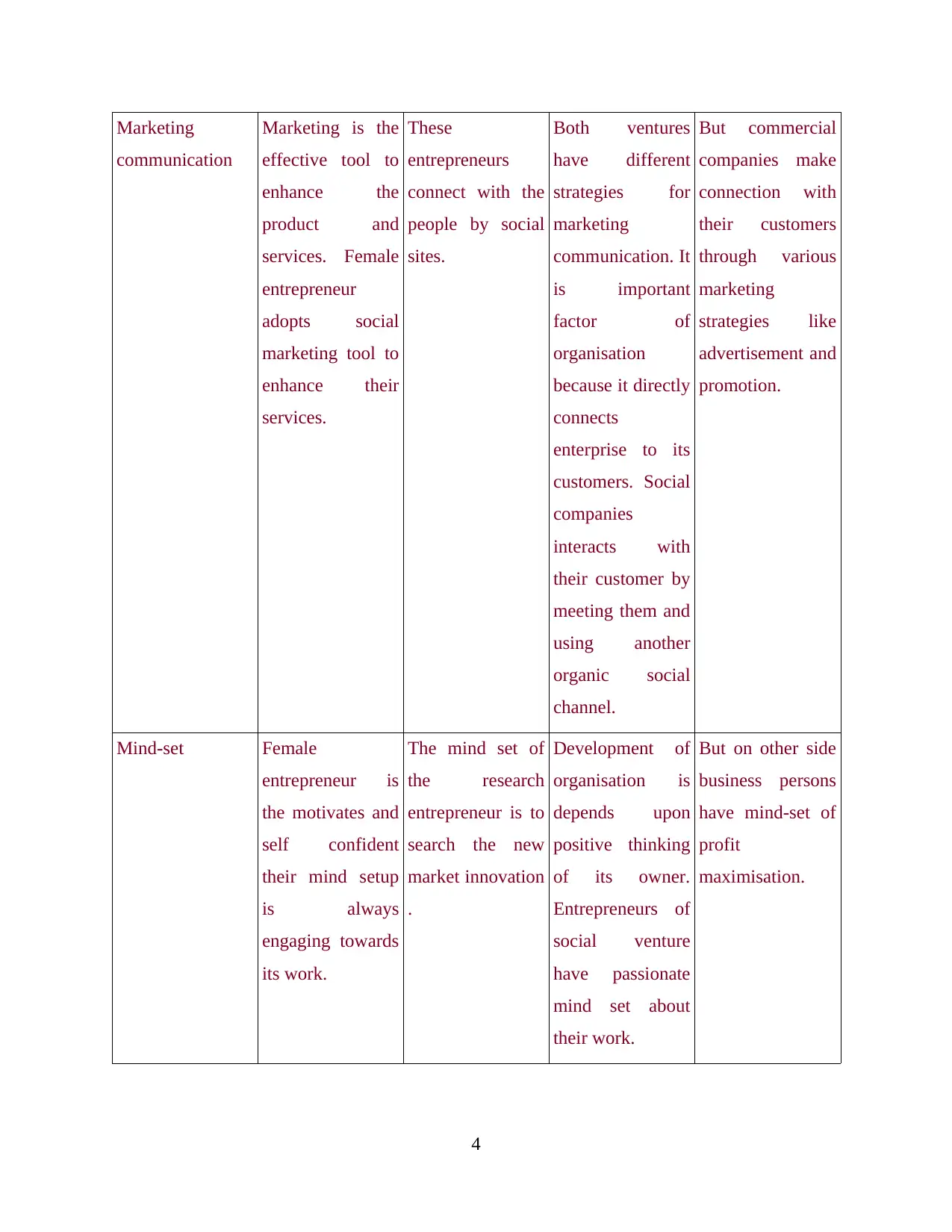
Marketing
communication
Marketing is the
effective tool to
enhance the
product and
services. Female
entrepreneur
adopts social
marketing tool to
enhance their
services.
These
entrepreneurs
connect with the
people by social
sites.
Both ventures
have different
strategies for
marketing
communication. It
is important
factor of
organisation
because it directly
connects
enterprise to its
customers. Social
companies
interacts with
their customer by
meeting them and
using another
organic social
channel.
But commercial
companies make
connection with
their customers
through various
marketing
strategies like
advertisement and
promotion.
Mind-set Female
entrepreneur is
the motivates and
self confident
their mind setup
is always
engaging towards
its work.
The mind set of
the research
entrepreneur is to
search the new
market innovation
.
Development of
organisation is
depends upon
positive thinking
of its owner.
Entrepreneurs of
social venture
have passionate
mind set about
their work.
But on other side
business persons
have mind-set of
profit
maximisation.
4
communication
Marketing is the
effective tool to
enhance the
product and
services. Female
entrepreneur
adopts social
marketing tool to
enhance their
services.
These
entrepreneurs
connect with the
people by social
sites.
Both ventures
have different
strategies for
marketing
communication. It
is important
factor of
organisation
because it directly
connects
enterprise to its
customers. Social
companies
interacts with
their customer by
meeting them and
using another
organic social
channel.
But commercial
companies make
connection with
their customers
through various
marketing
strategies like
advertisement and
promotion.
Mind-set Female
entrepreneur is
the motivates and
self confident
their mind setup
is always
engaging towards
its work.
The mind set of
the research
entrepreneur is to
search the new
market innovation
.
Development of
organisation is
depends upon
positive thinking
of its owner.
Entrepreneurs of
social venture
have passionate
mind set about
their work.
But on other side
business persons
have mind-set of
profit
maximisation.
4
Paraphrase This Document
Need a fresh take? Get an instant paraphrase of this document with our AI Paraphraser
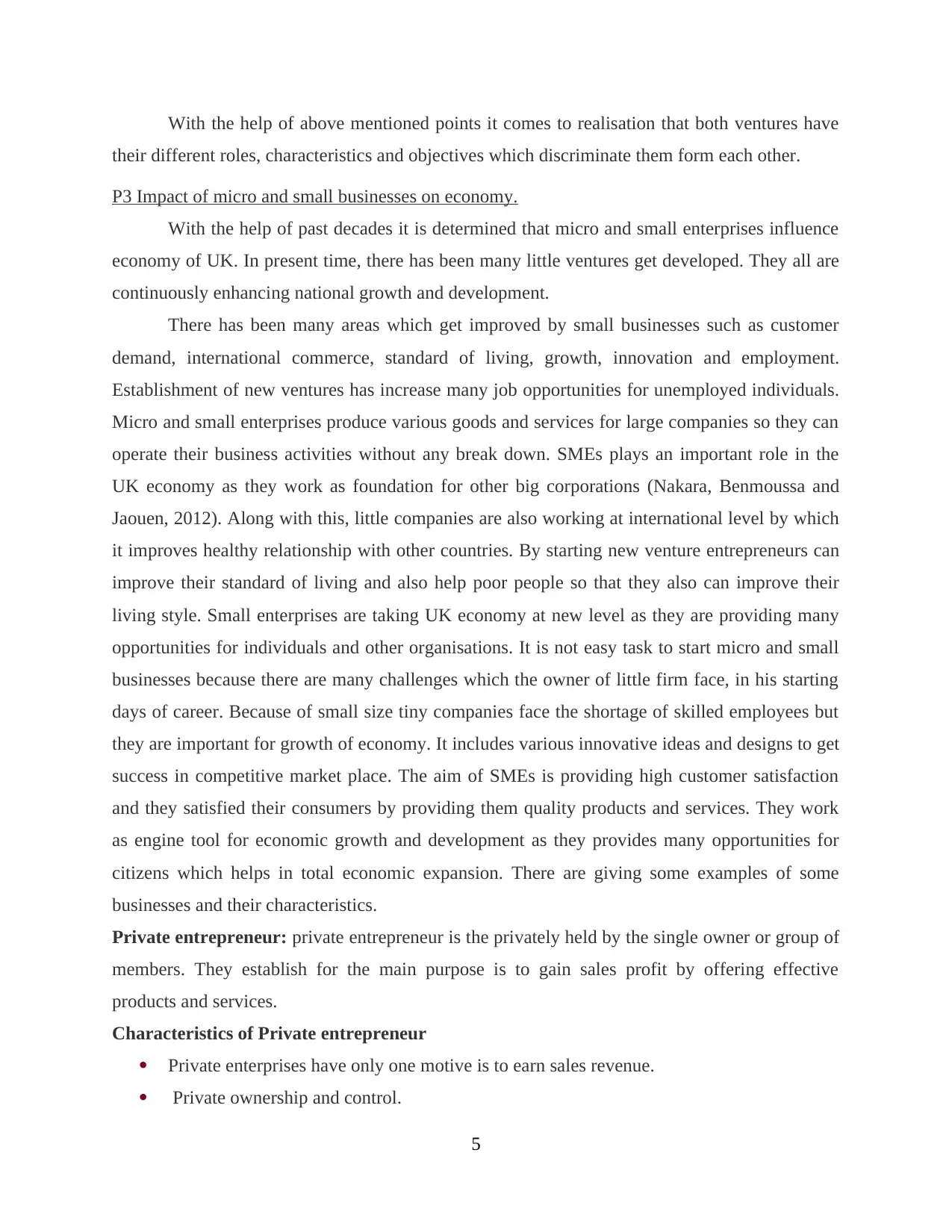
With the help of above mentioned points it comes to realisation that both ventures have
their different roles, characteristics and objectives which discriminate them form each other.
P3 Impact of micro and small businesses on economy.
With the help of past decades it is determined that micro and small enterprises influence
economy of UK. In present time, there has been many little ventures get developed. They all are
continuously enhancing national growth and development.
There has been many areas which get improved by small businesses such as customer
demand, international commerce, standard of living, growth, innovation and employment.
Establishment of new ventures has increase many job opportunities for unemployed individuals.
Micro and small enterprises produce various goods and services for large companies so they can
operate their business activities without any break down. SMEs plays an important role in the
UK economy as they work as foundation for other big corporations (Nakara, Benmoussa and
Jaouen, 2012). Along with this, little companies are also working at international level by which
it improves healthy relationship with other countries. By starting new venture entrepreneurs can
improve their standard of living and also help poor people so that they also can improve their
living style. Small enterprises are taking UK economy at new level as they are providing many
opportunities for individuals and other organisations. It is not easy task to start micro and small
businesses because there are many challenges which the owner of little firm face, in his starting
days of career. Because of small size tiny companies face the shortage of skilled employees but
they are important for growth of economy. It includes various innovative ideas and designs to get
success in competitive market place. The aim of SMEs is providing high customer satisfaction
and they satisfied their consumers by providing them quality products and services. They work
as engine tool for economic growth and development as they provides many opportunities for
citizens which helps in total economic expansion. There are giving some examples of some
businesses and their characteristics.
Private entrepreneur: private entrepreneur is the privately held by the single owner or group of
members. They establish for the main purpose is to gain sales profit by offering effective
products and services.
Characteristics of Private entrepreneur
Private enterprises have only one motive is to earn sales revenue.
Private ownership and control.
5
their different roles, characteristics and objectives which discriminate them form each other.
P3 Impact of micro and small businesses on economy.
With the help of past decades it is determined that micro and small enterprises influence
economy of UK. In present time, there has been many little ventures get developed. They all are
continuously enhancing national growth and development.
There has been many areas which get improved by small businesses such as customer
demand, international commerce, standard of living, growth, innovation and employment.
Establishment of new ventures has increase many job opportunities for unemployed individuals.
Micro and small enterprises produce various goods and services for large companies so they can
operate their business activities without any break down. SMEs plays an important role in the
UK economy as they work as foundation for other big corporations (Nakara, Benmoussa and
Jaouen, 2012). Along with this, little companies are also working at international level by which
it improves healthy relationship with other countries. By starting new venture entrepreneurs can
improve their standard of living and also help poor people so that they also can improve their
living style. Small enterprises are taking UK economy at new level as they are providing many
opportunities for individuals and other organisations. It is not easy task to start micro and small
businesses because there are many challenges which the owner of little firm face, in his starting
days of career. Because of small size tiny companies face the shortage of skilled employees but
they are important for growth of economy. It includes various innovative ideas and designs to get
success in competitive market place. The aim of SMEs is providing high customer satisfaction
and they satisfied their consumers by providing them quality products and services. They work
as engine tool for economic growth and development as they provides many opportunities for
citizens which helps in total economic expansion. There are giving some examples of some
businesses and their characteristics.
Private entrepreneur: private entrepreneur is the privately held by the single owner or group of
members. They establish for the main purpose is to gain sales profit by offering effective
products and services.
Characteristics of Private entrepreneur
Private enterprises have only one motive is to earn sales revenue.
Private ownership and control.
5
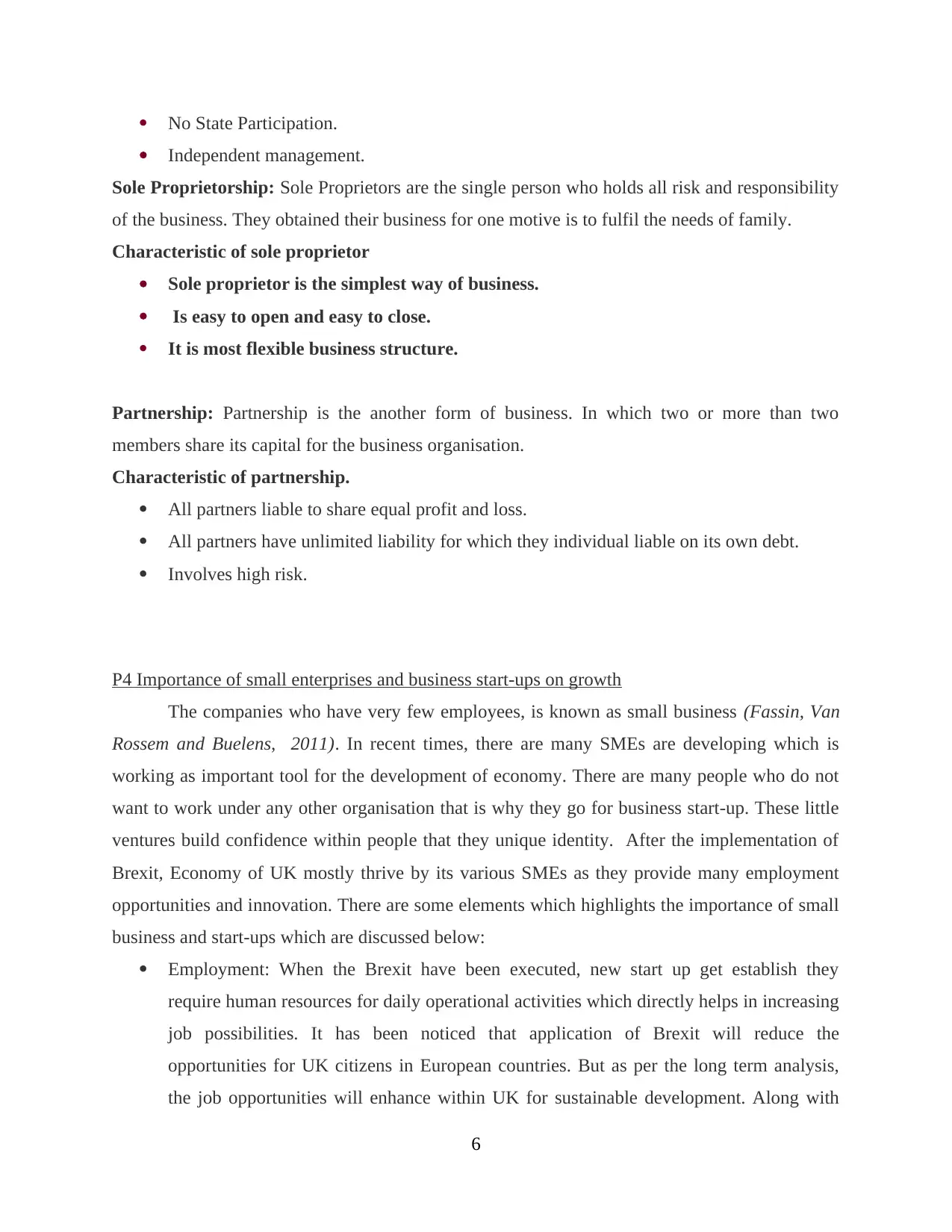
No State Participation.
Independent management.
Sole Proprietorship: Sole Proprietors are the single person who holds all risk and responsibility
of the business. They obtained their business for one motive is to fulfil the needs of family.
Characteristic of sole proprietor
Sole proprietor is the simplest way of business.
Is easy to open and easy to close.
It is most flexible business structure.
Partnership: Partnership is the another form of business. In which two or more than two
members share its capital for the business organisation.
Characteristic of partnership.
All partners liable to share equal profit and loss.
All partners have unlimited liability for which they individual liable on its own debt.
Involves high risk.
P4 Importance of small enterprises and business start-ups on growth
The companies who have very few employees, is known as small business (Fassin, Van
Rossem and Buelens, 2011). In recent times, there are many SMEs are developing which is
working as important tool for the development of economy. There are many people who do not
want to work under any other organisation that is why they go for business start-up. These little
ventures build confidence within people that they unique identity. After the implementation of
Brexit, Economy of UK mostly thrive by its various SMEs as they provide many employment
opportunities and innovation. There are some elements which highlights the importance of small
business and start-ups which are discussed below:
Employment: When the Brexit have been executed, new start up get establish they
require human resources for daily operational activities which directly helps in increasing
job possibilities. It has been noticed that application of Brexit will reduce the
opportunities for UK citizens in European countries. But as per the long term analysis,
the job opportunities will enhance within UK for sustainable development. Along with
6
Independent management.
Sole Proprietorship: Sole Proprietors are the single person who holds all risk and responsibility
of the business. They obtained their business for one motive is to fulfil the needs of family.
Characteristic of sole proprietor
Sole proprietor is the simplest way of business.
Is easy to open and easy to close.
It is most flexible business structure.
Partnership: Partnership is the another form of business. In which two or more than two
members share its capital for the business organisation.
Characteristic of partnership.
All partners liable to share equal profit and loss.
All partners have unlimited liability for which they individual liable on its own debt.
Involves high risk.
P4 Importance of small enterprises and business start-ups on growth
The companies who have very few employees, is known as small business (Fassin, Van
Rossem and Buelens, 2011). In recent times, there are many SMEs are developing which is
working as important tool for the development of economy. There are many people who do not
want to work under any other organisation that is why they go for business start-up. These little
ventures build confidence within people that they unique identity. After the implementation of
Brexit, Economy of UK mostly thrive by its various SMEs as they provide many employment
opportunities and innovation. There are some elements which highlights the importance of small
business and start-ups which are discussed below:
Employment: When the Brexit have been executed, new start up get establish they
require human resources for daily operational activities which directly helps in increasing
job possibilities. It has been noticed that application of Brexit will reduce the
opportunities for UK citizens in European countries. But as per the long term analysis,
the job opportunities will enhance within UK for sustainable development. Along with
6
⊘ This is a preview!⊘
Do you want full access?
Subscribe today to unlock all pages.

Trusted by 1+ million students worldwide
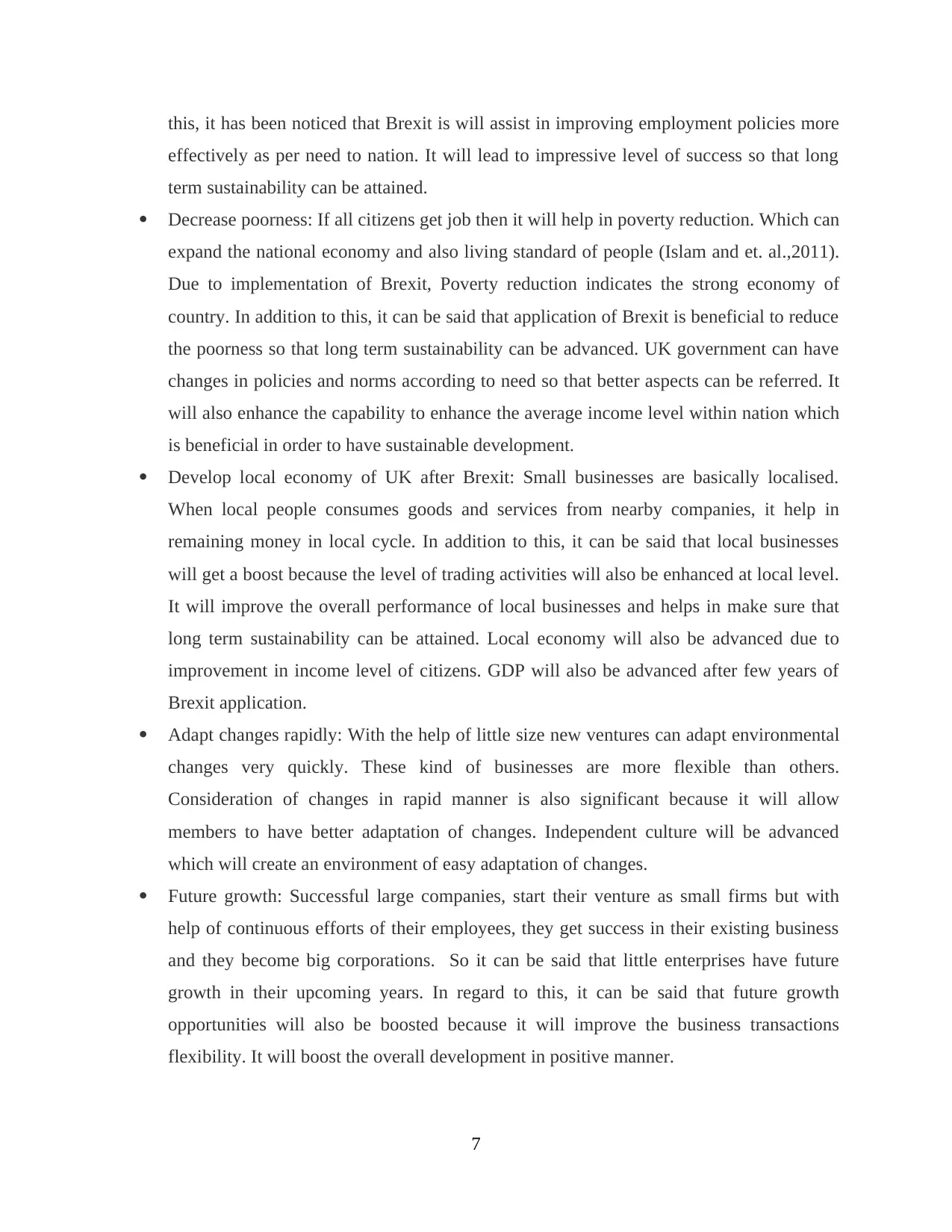
this, it has been noticed that Brexit is will assist in improving employment policies more
effectively as per need to nation. It will lead to impressive level of success so that long
term sustainability can be attained.
Decrease poorness: If all citizens get job then it will help in poverty reduction. Which can
expand the national economy and also living standard of people (Islam and et. al.,2011).
Due to implementation of Brexit, Poverty reduction indicates the strong economy of
country. In addition to this, it can be said that application of Brexit is beneficial to reduce
the poorness so that long term sustainability can be advanced. UK government can have
changes in policies and norms according to need so that better aspects can be referred. It
will also enhance the capability to enhance the average income level within nation which
is beneficial in order to have sustainable development.
Develop local economy of UK after Brexit: Small businesses are basically localised.
When local people consumes goods and services from nearby companies, it help in
remaining money in local cycle. In addition to this, it can be said that local businesses
will get a boost because the level of trading activities will also be enhanced at local level.
It will improve the overall performance of local businesses and helps in make sure that
long term sustainability can be attained. Local economy will also be advanced due to
improvement in income level of citizens. GDP will also be advanced after few years of
Brexit application.
Adapt changes rapidly: With the help of little size new ventures can adapt environmental
changes very quickly. These kind of businesses are more flexible than others.
Consideration of changes in rapid manner is also significant because it will allow
members to have better adaptation of changes. Independent culture will be advanced
which will create an environment of easy adaptation of changes.
Future growth: Successful large companies, start their venture as small firms but with
help of continuous efforts of their employees, they get success in their existing business
and they become big corporations. So it can be said that little enterprises have future
growth in their upcoming years. In regard to this, it can be said that future growth
opportunities will also be boosted because it will improve the business transactions
flexibility. It will boost the overall development in positive manner.
7
effectively as per need to nation. It will lead to impressive level of success so that long
term sustainability can be attained.
Decrease poorness: If all citizens get job then it will help in poverty reduction. Which can
expand the national economy and also living standard of people (Islam and et. al.,2011).
Due to implementation of Brexit, Poverty reduction indicates the strong economy of
country. In addition to this, it can be said that application of Brexit is beneficial to reduce
the poorness so that long term sustainability can be advanced. UK government can have
changes in policies and norms according to need so that better aspects can be referred. It
will also enhance the capability to enhance the average income level within nation which
is beneficial in order to have sustainable development.
Develop local economy of UK after Brexit: Small businesses are basically localised.
When local people consumes goods and services from nearby companies, it help in
remaining money in local cycle. In addition to this, it can be said that local businesses
will get a boost because the level of trading activities will also be enhanced at local level.
It will improve the overall performance of local businesses and helps in make sure that
long term sustainability can be attained. Local economy will also be advanced due to
improvement in income level of citizens. GDP will also be advanced after few years of
Brexit application.
Adapt changes rapidly: With the help of little size new ventures can adapt environmental
changes very quickly. These kind of businesses are more flexible than others.
Consideration of changes in rapid manner is also significant because it will allow
members to have better adaptation of changes. Independent culture will be advanced
which will create an environment of easy adaptation of changes.
Future growth: Successful large companies, start their venture as small firms but with
help of continuous efforts of their employees, they get success in their existing business
and they become big corporations. So it can be said that little enterprises have future
growth in their upcoming years. In regard to this, it can be said that future growth
opportunities will also be boosted because it will improve the business transactions
flexibility. It will boost the overall development in positive manner.
7
Paraphrase This Document
Need a fresh take? Get an instant paraphrase of this document with our AI Paraphraser
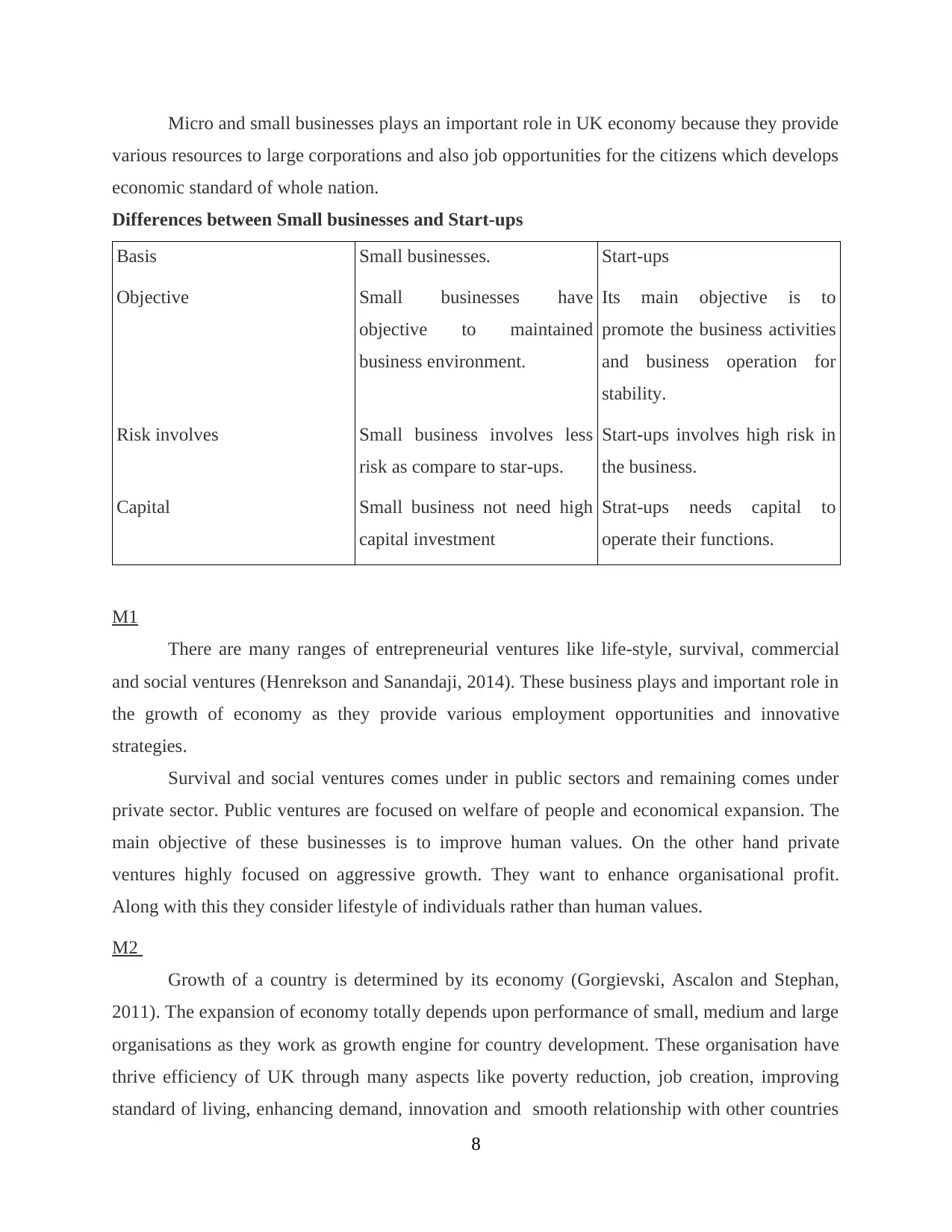
Micro and small businesses plays an important role in UK economy because they provide
various resources to large corporations and also job opportunities for the citizens which develops
economic standard of whole nation.
Differences between Small businesses and Start-ups
Basis Small businesses. Start-ups
Objective Small businesses have
objective to maintained
business environment.
Its main objective is to
promote the business activities
and business operation for
stability.
Risk involves Small business involves less
risk as compare to star-ups.
Start-ups involves high risk in
the business.
Capital Small business not need high
capital investment
Strat-ups needs capital to
operate their functions.
M1
There are many ranges of entrepreneurial ventures like life-style, survival, commercial
and social ventures (Henrekson and Sanandaji, 2014). These business plays and important role in
the growth of economy as they provide various employment opportunities and innovative
strategies.
Survival and social ventures comes under in public sectors and remaining comes under
private sector. Public ventures are focused on welfare of people and economical expansion. The
main objective of these businesses is to improve human values. On the other hand private
ventures highly focused on aggressive growth. They want to enhance organisational profit.
Along with this they consider lifestyle of individuals rather than human values.
M2
Growth of a country is determined by its economy (Gorgievski, Ascalon and Stephan,
2011). The expansion of economy totally depends upon performance of small, medium and large
organisations as they work as growth engine for country development. These organisation have
thrive efficiency of UK through many aspects like poverty reduction, job creation, improving
standard of living, enhancing demand, innovation and smooth relationship with other countries
8
various resources to large corporations and also job opportunities for the citizens which develops
economic standard of whole nation.
Differences between Small businesses and Start-ups
Basis Small businesses. Start-ups
Objective Small businesses have
objective to maintained
business environment.
Its main objective is to
promote the business activities
and business operation for
stability.
Risk involves Small business involves less
risk as compare to star-ups.
Start-ups involves high risk in
the business.
Capital Small business not need high
capital investment
Strat-ups needs capital to
operate their functions.
M1
There are many ranges of entrepreneurial ventures like life-style, survival, commercial
and social ventures (Henrekson and Sanandaji, 2014). These business plays and important role in
the growth of economy as they provide various employment opportunities and innovative
strategies.
Survival and social ventures comes under in public sectors and remaining comes under
private sector. Public ventures are focused on welfare of people and economical expansion. The
main objective of these businesses is to improve human values. On the other hand private
ventures highly focused on aggressive growth. They want to enhance organisational profit.
Along with this they consider lifestyle of individuals rather than human values.
M2
Growth of a country is determined by its economy (Gorgievski, Ascalon and Stephan,
2011). The expansion of economy totally depends upon performance of small, medium and large
organisations as they work as growth engine for country development. These organisation have
thrive efficiency of UK through many aspects like poverty reduction, job creation, improving
standard of living, enhancing demand, innovation and smooth relationship with other countries
8
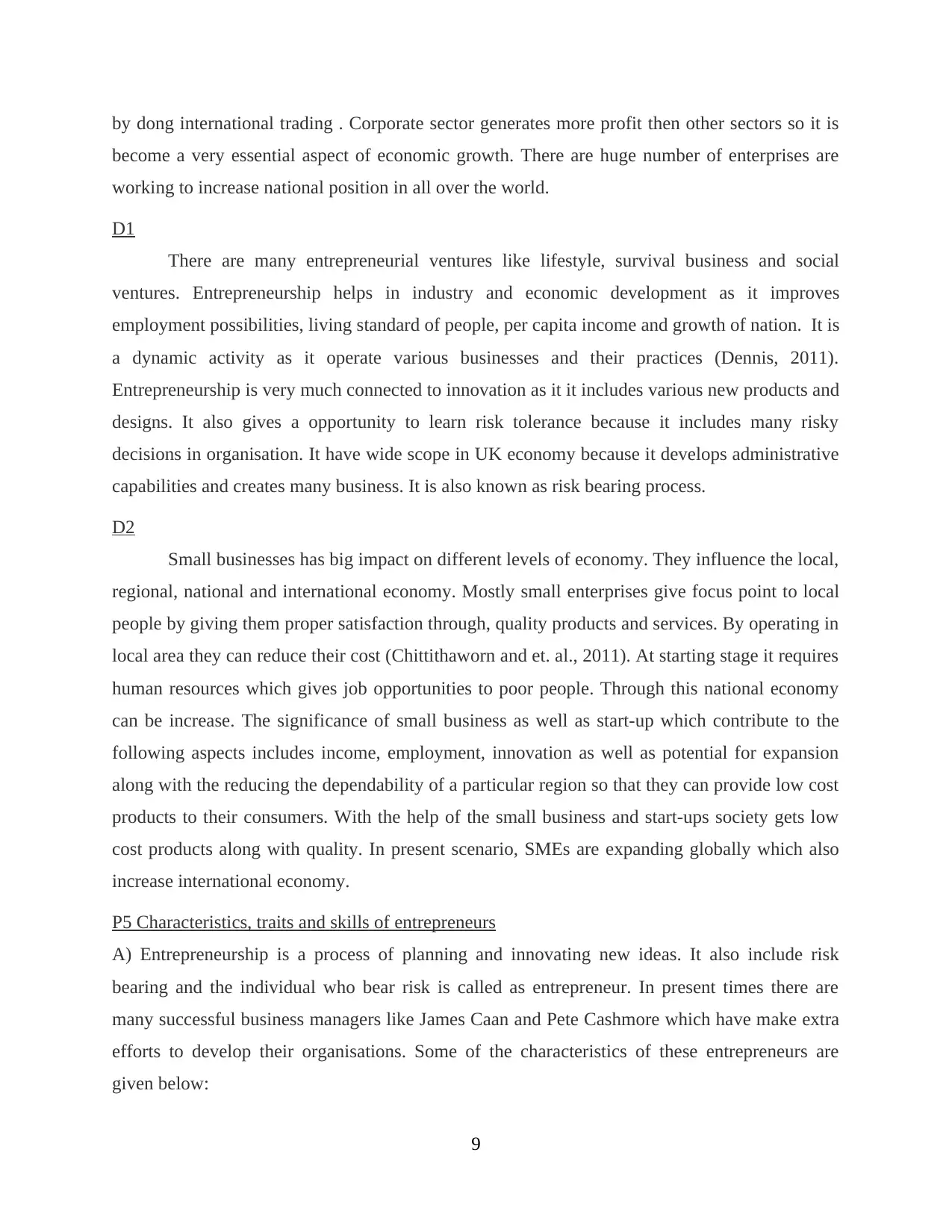
by dong international trading . Corporate sector generates more profit then other sectors so it is
become a very essential aspect of economic growth. There are huge number of enterprises are
working to increase national position in all over the world.
D1
There are many entrepreneurial ventures like lifestyle, survival business and social
ventures. Entrepreneurship helps in industry and economic development as it improves
employment possibilities, living standard of people, per capita income and growth of nation. It is
a dynamic activity as it operate various businesses and their practices (Dennis, 2011).
Entrepreneurship is very much connected to innovation as it it includes various new products and
designs. It also gives a opportunity to learn risk tolerance because it includes many risky
decisions in organisation. It have wide scope in UK economy because it develops administrative
capabilities and creates many business. It is also known as risk bearing process.
D2
Small businesses has big impact on different levels of economy. They influence the local,
regional, national and international economy. Mostly small enterprises give focus point to local
people by giving them proper satisfaction through, quality products and services. By operating in
local area they can reduce their cost (Chittithaworn and et. al., 2011). At starting stage it requires
human resources which gives job opportunities to poor people. Through this national economy
can be increase. The significance of small business as well as start-up which contribute to the
following aspects includes income, employment, innovation as well as potential for expansion
along with the reducing the dependability of a particular region so that they can provide low cost
products to their consumers. With the help of the small business and start-ups society gets low
cost products along with quality. In present scenario, SMEs are expanding globally which also
increase international economy.
P5 Characteristics, traits and skills of entrepreneurs
A) Entrepreneurship is a process of planning and innovating new ideas. It also include risk
bearing and the individual who bear risk is called as entrepreneur. In present times there are
many successful business managers like James Caan and Pete Cashmore which have make extra
efforts to develop their organisations. Some of the characteristics of these entrepreneurs are
given below:
9
become a very essential aspect of economic growth. There are huge number of enterprises are
working to increase national position in all over the world.
D1
There are many entrepreneurial ventures like lifestyle, survival business and social
ventures. Entrepreneurship helps in industry and economic development as it improves
employment possibilities, living standard of people, per capita income and growth of nation. It is
a dynamic activity as it operate various businesses and their practices (Dennis, 2011).
Entrepreneurship is very much connected to innovation as it it includes various new products and
designs. It also gives a opportunity to learn risk tolerance because it includes many risky
decisions in organisation. It have wide scope in UK economy because it develops administrative
capabilities and creates many business. It is also known as risk bearing process.
D2
Small businesses has big impact on different levels of economy. They influence the local,
regional, national and international economy. Mostly small enterprises give focus point to local
people by giving them proper satisfaction through, quality products and services. By operating in
local area they can reduce their cost (Chittithaworn and et. al., 2011). At starting stage it requires
human resources which gives job opportunities to poor people. Through this national economy
can be increase. The significance of small business as well as start-up which contribute to the
following aspects includes income, employment, innovation as well as potential for expansion
along with the reducing the dependability of a particular region so that they can provide low cost
products to their consumers. With the help of the small business and start-ups society gets low
cost products along with quality. In present scenario, SMEs are expanding globally which also
increase international economy.
P5 Characteristics, traits and skills of entrepreneurs
A) Entrepreneurship is a process of planning and innovating new ideas. It also include risk
bearing and the individual who bear risk is called as entrepreneur. In present times there are
many successful business managers like James Caan and Pete Cashmore which have make extra
efforts to develop their organisations. Some of the characteristics of these entrepreneurs are
given below:
9
⊘ This is a preview!⊘
Do you want full access?
Subscribe today to unlock all pages.

Trusted by 1+ million students worldwide
1 out of 19
Related Documents
Your All-in-One AI-Powered Toolkit for Academic Success.
+13062052269
info@desklib.com
Available 24*7 on WhatsApp / Email
![[object Object]](/_next/static/media/star-bottom.7253800d.svg)
Unlock your academic potential
Copyright © 2020–2026 A2Z Services. All Rights Reserved. Developed and managed by ZUCOL.




